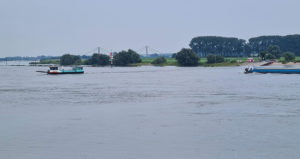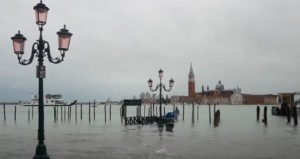Germany decides to speed up flood protection

-
 Editorial Team
Editorial Team
Share article:
Bold action to strengthen Germany’s flood protection, accelerate climate adaptation and secure sustainable financing. These objectives were agreed upon during the 103rd environment ministers’ conference that took place from the 27th to the 29th of November in Germany. Part of this conference was an excursion to the Ahrtal that was hit by severe floods in 2021.
The 103rd environment ministers’ Conference (Umweltministerkonferenz, UMK) included Germany’s federal environment minister Katrin Eder and the environment ministers, senators and representatives from all 16 German federal states. To address the increasing frequency and severity of flooding, the UMK urged the swift passage of the Flood Protection Act III (Hochwasserschutzgesetz III) that was proposed in October 2024. Key measures include strengthening heavy rain prevention and imposing stricter requirements for critical infrastructure, such as bridges and roads, to enhance resilience against extreme weather events. The designation of flood protection as a project of overriding public interest was also proposed. This classification would accelerate planning and approval processes, enabling faster implementation of critical infrastructure projects.
Ahrtal floods
The Ahrtal floods of 2021 showed how destructive extreme weather events can be. The Ahrtal floods were one of Germany’s most devastating natural disasters in recent history. In Juli of this year an unprecedented amount of rainfall caused the Ahr river, a tributary of the Rhine, to swell dramatically, resulting in catastrophic flooding. The extreme weather was part of a broader weather system that affected several European countries. In the Ahr Valley the floodings hit entire villages, washed away homes, bridges, roads, and left a trail of devastation across the region. During these floods 135 people lost their lives and thousands had to move and live somewhere else. The region also faced severe infrastructure damage, including the destruction of utilities and transportation networks. Three years later the damage in the towns is still visible.

Flood prevention
During the conference the participants visited the Ahrtal. Rhineland-Palatinate’s environment minister Katrin Eder, who chaired the conference, said: “The catastrophic Ahr Valley floods of 2021 remain engraved into our collective memory, a stark reminder of the human toll of extreme weather. To prevent such tragedies, we must reshape our approach to environmental planning, secure robust financing, and act decisively on climate adaptation.” Federal environment minister Steffi Lemke said during the excursion it was deeply distressing to see the lingering damage from the flood disaster.
Proposed constitutional amendment
The UMK proposed amending Germany’s constitution to establish flood protection in Germany, climate adaptation, and nature conservation as a joint task for federal and state governments. This amendment would allow the federal government to provide direct support to municipalities for initiatives including the construction of flood retention basins (Regenrückhaltebecken), the renaturalization of rivers and floodplains, and the enhancement of urban green spaces to mitigate heatwaves. Lemke highlighted the benefits of the constitutional amendment. “This would boost natural flood protection measures like river renaturalization, which not only reduces water flow speed but also restores biodiversity. Technical solutions alone are not enough. The new law can and should be passed quickly in the new legislative period with broad support in the national government and Bundestag.” In Germany the current government fell recently and elections will be held in February 2025.

















